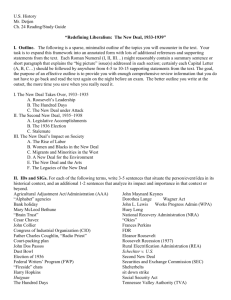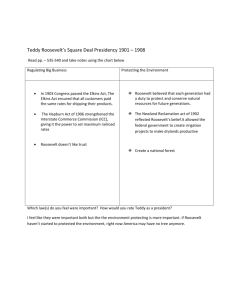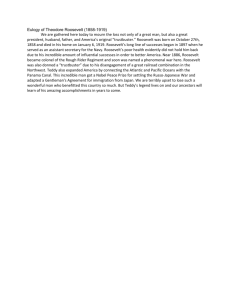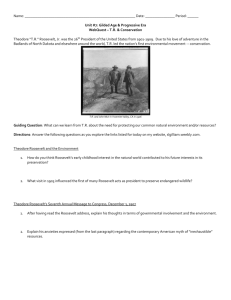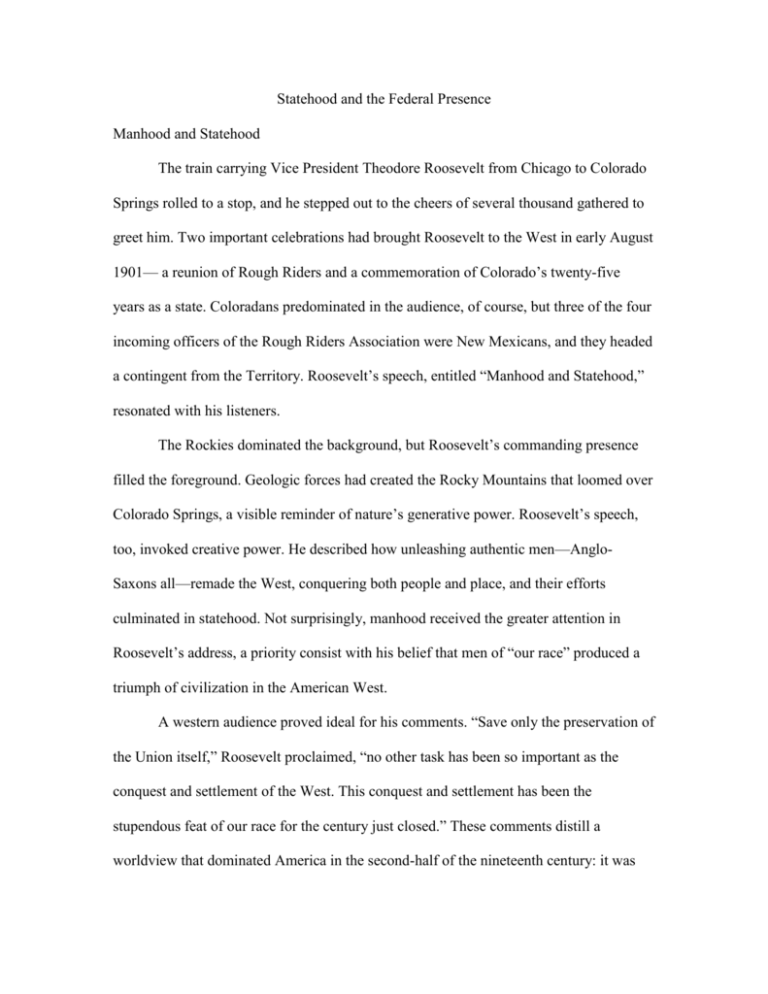
Statehood and the Federal Presence
Manhood and Statehood
The train carrying Vice President Theodore Roosevelt from Chicago to Colorado
Springs rolled to a stop, and he stepped out to the cheers of several thousand gathered to
greet him. Two important celebrations had brought Roosevelt to the West in early August
1901— a reunion of Rough Riders and a commemoration of Colorado’s twenty-five
years as a state. Coloradans predominated in the audience, of course, but three of the four
incoming officers of the Rough Riders Association were New Mexicans, and they headed
a contingent from the Territory. Roosevelt’s speech, entitled “Manhood and Statehood,”
resonated with his listeners.
The Rockies dominated the background, but Roosevelt’s commanding presence
filled the foreground. Geologic forces had created the Rocky Mountains that loomed over
Colorado Springs, a visible reminder of nature’s generative power. Roosevelt’s speech,
too, invoked creative power. He described how unleashing authentic men—AngloSaxons all—remade the West, conquering both people and place, and their efforts
culminated in statehood. Not surprisingly, manhood received the greater attention in
Roosevelt’s address, a priority consist with his belief that men of “our race” produced a
triumph of civilization in the American West.
A western audience proved ideal for his comments. “Save only the preservation of
the Union itself,” Roosevelt proclaimed, “no other task has been so important as the
conquest and settlement of the West. This conquest and settlement has been the
stupendous feat of our race for the century just closed.” These comments distill a
worldview that dominated America in the second-half of the nineteenth century: it was
the country’s manifest destiny to conquer and rule lands and people between the
Mississippi River and the Pacific Ocean. Roosevelt had remade himself from a fragile,
asthmatic child into a vigorous, take-charge man by going west, and he believed his
transformation was being writ large in American history. Men yearning to prove
themselves headed out to become masters in new domains secured by their prowess.
Roosevelt, ever the unapologetic warrior, resurrected as a central theme of his
speech a nostrum handed down from of old: “might makes right.” Heralding a new
century, Roosevelt celebrated the triumphal progress of “our race” in “the way in which
our people have filled a vacant continent with self-governing commonwealths, knit into
one nation.” Warming to his theme of conquest begetting civilization, he told his
audience, “And of all this marvelous history, perhaps the most wonderful portion is that
which deals with the way in which the Pacific Coast and the Rocky Mountains were
settled.”
The geographic tabula rasa posited by Roosevelt erased the Native Americans
and Hispanics living in New Mexico and elsewhere in the West. Yet these people existed,
an inconvenient reality that could be pushed aside for only a while. For Native Americans
in particular, the federal government would have to begin addressing their claims to land,
resources, and citizenship within a few decades. But for Roosevelt—and like-minded
adherents of unbridled internal colonialism—Indians and Hispanics amounted to little
more than detritus to be pushed aside. As Roosevelt proclaimed, “The winning of the
West was the greatest epic feat in the history of our race” because it produced “victory
after victory in the ceaseless strife waged against wild men and wild nature.”
What Roosevelt celebrated as the “greatest epic feat” in 1901 would be rightly
challenged beginning in the 1960s for gross injustices toward Native Americans,
Hispanics, and the land. Their critiques of wanton abuses are conscious-pricking
reminders of the hubris of an earlier era. But more than that: they testify to a personal
truth by showing how searing memory can be. That is, recollection of past, unjust acts
amounts to ‘historical flashbacks’ that bring to the surface unhealed injuries. For those
most violated by conquest, statehood merely institutionalized the uneven distribution of
power; and calls to bring redress through social justice continue to the present day.
In Roosevelt’s embrace of the suppression of Hispanics and Native Americans in
the conquest of the West, we also see the limits of decolonialization, specifically its
hierarchical allocation of power and, as a consequence, inequality in political and
economic success. “Manhood and Statehood” is a statement about the transfer of power
from conquering elites to a newly resident set of elites in lands claimed by Americans.
Implicit in Roosevelt’s description is justification of an Anglo-centric power relationship,
one known in the second-half of the nineteenth century as unrelenting Manifest Destiny.
The Territories began as military outposts into which poured settlers, and then a pattern
of civilian takeover ensued. As new battlefields opened farther westward in America’s
hegemonic thrust, the conquered lands filled in with settlers, and new states eventually
emerged. Those best positioned to benefit from statehood pursued it vigorously, most
notably economic and commercial elites seeking to amass land and money. But those
already on the land—Hispanics and Native Americans—had little in common with the
new settlers and they took a wholly different role in the drive toward statehood: trying to
hold onto what they had.
Conquest of “wild men and wild nature” opened the way to reshape a landscape to
sustain new purposes, according to Roosevelt, “because the conditions of development in
the West have steadily tended to accentuate the peculiarly American characteristic of its
people.” Roosevelt’s words show his enthusiasm for forging a national character in the
former frontier. He not only created anew the map of the West, his supreme confidence in
“our race” permitted him to prescribe the “American” character that would blossom
there. And whenever sufficient numbers of such men “have taken possession of some
great tract of empty wilderness, they should be permitted to enter the Union as a state.”
As confident as he was in the inevitability of westward expansion, his use of
“should” signaled an important caveat. A true man always knew he was being tested and
therefore he had “to persevere through the long days of slow progress or of seeming
failure which always come before any final triumph.” The admonition to persevere amid
all setbacks became Roosevelt’s lodestar when navigating complexity and adversity, and
it guided his attempts to secure statehood for New Mexico. He offered his audience a
prophetic coda whose significance those seeking New Mexico’s statehood could hardly
have grasped: “It is not given to us all to succeed, but it is given to us all to strive
manfully to deserve success.”
In Colorado Springs, Roosevelt set forth principles that would echo in the fight
for New Mexico’s statehood. In their conquest of the West, he expected settlers to
vanquish all human and natural barriers to progress. But the next step, the federal
government’s approval of statehood, remained but a promise, a tantalizing foretaste,
attainable through steadfast striving by American men forged in a crucible of challenge.
While worthiness existed independent of attaining a goal, true manhood resided in effort,
of testing oneself. And all Roosevelt ever really promised New Mexicans was an effort,
to do what he could, and not to give up even when the odds seemed overwhelming.
That manhood bequeathed statehood had a wholly different meaning to one of the
guests present in Colorado Springs that August day in 1901. Henry Moore Teller,
Colorado’s senior Republican U.S. Senator then in his third term, and an advocate of
New Mexico’s statehood, would win re-election in 1902 for a fourth term, but this time
as a Democrat. In an interview following his party switch, he argued from personal
experience that political rights were essential to attaining manhood for residents of the
Territorities:
I know some of the disadvantages of Territorial life. I know the debasing
influences on a man living where he does not govern himself. If you want to
make citizens and men of these people, you should give them their rights. Men
who govern themselves grow in manhood, and all the essentials and virtues of
manhood, and men whom you deprive of those rights depreciate in those high
qualities.
What did Senator Teller’s description of “men whom you deprive of those rights
depreciate in those qualities” connote to residents of the Territory? It is very hard to
characterize something as complex as the mental outlook of New Mexicans in the decade
1900-10, but commonly encountered words depicting their status are those evoking
subjugation, servitude, and second-class citizenship. Former Governor L. Bradford Prince
(1889-93) spoke in such terms when he contrasted the degradation of the past with the
ennobling virtues of statehood. Upon passage of the Enabling Bill for statehood in June
1910, Prince declared, “The people of New Mexico were no longer serfs but Freemen; no
longer subjects but Citizens; no longer to be treated as aliens, but as Americans.”
Today these words resonate with the vocabulary of the other significant decolonization
experience in the United States in the twentieth century—the Civil Rights movement:
“Free at last, free at last. Thank God Almighty, we are free at last.”
Both Roosevelt and Teller finished their final elected terms and departed
government service in March 1909 without seeing the Territories rewarded with
statehood. For his part during these years, Roosevelt waged his particular variant of a
“manly” battle for statehood—a patriarch intertwining effort with moralizing. Senator
Teller consistently advocated immediate statehood, but his exhortations failed to sway
recalcitrant Republican senators. Instead, they saw in his defection to the Democrats
proof of the West’s political volatility and a cautionary reminder that any new states
would surely send more Democrats to Congress.
Only with the mindset of a colonizer can power and conquest be rationalized as
morally commendable, but such views prevailed at the turn of the twentieth century.
Internal colonialism represented a compelling force that swept aside contradictions and
objections, and no greater advocate existed than Theodore Roosevelt. A year before he
spoke in Colorado Springs, he had drawn on the tropes of manifest destiny and barren
wasteland in explaining his hopes for New Mexico:
I do not have to argue for expansion to you in New Mexico for you are
yourselves the best possible example of it. You or your fathers have expanded
into the waste places of the great Southwest exactly as America is now
expanding. You have red blood in your veins, and are not of the kind to
tolerate a nation shirking its work.
In the same letter he also told the head of the 400-member Republican Club of
Las Vegas that New Mexico “is entitled to Statehood. And I need not tell you that all I
can do to get it admitted as a State I will do.” But the confident pledge in his letter would
soon yield to political pressures in Congress to go slowly. President Theodore
Roosevelt’s response to legislators’ reluctance to move rapidly to approve statehood has
not received the attention it merits. Three related themes need to be understood: the claim
the Territory made on him; the shallowness of his understanding of the Territory; and the
limits of his power as president.
© 2008 by David V. Holtby. All rights reserved




